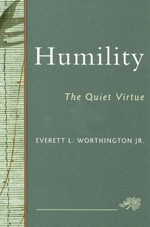OldSpeak
Book Review: Humility: The Quiet Virtue
By John W. Whitehead
February 19, 2008
[H]umility is a spiritual activity. It is opening the hands in love, extending the hands outward to other people, extending the open hands upwards to God, and receiving in an open heart the spirit of humility. Humility is letting that spirit come into us and energize our hands to be helping hands.—Everett L. Worthington, Jr.
 In today’s winner-take-all world, where personal advancement is highly rewarded and individuals actively seek to perform and advertise altruistic measures in order to gain their 15 minutes of fame, appreciation for virtues such as honesty and humility has been steadily declining. Over the past few decades, American society has become one which increasingly promotes self-progress over the service and advancement of others—ultimately condoning narcissistic attitudes and thwarting the very virtues which are fundamental to the advancement of humanity as a whole. In his book Humility: The Quiet Virtue, Everett L. Worthington, Jr. strives to revive the virtue of humility by drawing attention to its importance and meaning, as well as educating the public on its ultimate attainment.
In today’s winner-take-all world, where personal advancement is highly rewarded and individuals actively seek to perform and advertise altruistic measures in order to gain their 15 minutes of fame, appreciation for virtues such as honesty and humility has been steadily declining. Over the past few decades, American society has become one which increasingly promotes self-progress over the service and advancement of others—ultimately condoning narcissistic attitudes and thwarting the very virtues which are fundamental to the advancement of humanity as a whole. In his book Humility: The Quiet Virtue, Everett L. Worthington, Jr. strives to revive the virtue of humility by drawing attention to its importance and meaning, as well as educating the public on its ultimate attainment.
Worthington, a professor of psychology at Virginia Commonwealth University, acknowledges that the virtue of humility is highly paradoxical in nature—one that cannot be fully understood or defined through scientific means and one which is difficult, if not impossible, to attain through active measures. Thus, his analysis of the “quiet” virtue focuses primarily on the stories of a chosen few “Heroes of Humility,” people (both real and fictional) whose everyday lives exemplify modesty, humbleness and the power of serving others.
Worthington’s illustration of various “Heroes of Humility” allows him to draw several conclusions regarding the definition of the virtue and characteristics one must possess in order to truly embody it. While the term “humility” comes from the Latin word “humilis,” meaning low, insignificant and humble, Worthington acknowledges the fact that feelings of insignificance and low self-worth have no place in the lives of those who are truly humble. As Sir William Temple, archbishop of Canterbury, once wrote, “Humility does not mean thinking less of yourself than of other people, nor does it mean having a low opinion of your own gifts. It means freedom from thinking about yourself at all.” Worthington wholeheartedly agrees with this notion, noting that those who possess humility not only think of others over themselves, but they do so because they possess a true sense of perspective and see their lives primarily “in relation to the cosmos.”
Worthington not only defines humility through the examples he provides, he also attempts to draw conclusions regarding how one may “walk towards” humility and allow it to thrive in one’s everyday life. These hypothesized steps toward developing humility include nixing narcissism, eliminating entitlement, defeating pride, cultivating an accurate sense of self and practicing additional virtues. While these “tips” appear to be both reasonable and achievable, Worthington soon introduces another paradox by repeatedly stating that one “cannot fully reach humility by striving for it.” Thus, while “guidelines” regarding the development of humility may increase one’s knowledge of the virtue, Worthington recognizes that their active pursuit and implementation will ultimately prove to be fruitless. Instead, one may only develop humility through spiritual activity and the inspiration provided by one’s own “Heroes of Humility.”
While Worthington’s book often concedes to the very paradoxes that make the term difficult to define, develop and study through scientific means, his discussion of the virtue is both well-informed and highly admirable. His book not only draws attention to a virtue that is endangered in today’s competitive, individualistic society—spurring further contemplation and discussion—it also asks individuals to identify those people in their lives who are virtuous and to gain both strength and inspiration from their humble attitudes and actions.
Although Worthington roots his discussion of humility in the teachings of Christianity, various religions—such as Islam, Buddhism and Taoism—focus on the virtue, tying together people of all walks of life and religious backgrounds. Everett L. Worthington’s book creates a universal, unending cycle of humility and inspiration, one which begins with those who read his work, and quietly pervades the lives of individuals in every strata of American society. As American poet T.S. Eliot once wrote, “The only wisdom we can hope to acquire / Is the wisdom of humility: humility is endless.”
Highly recommended.
DISCLAIMER: THE VIEWS AND OPINIONS EXPRESSED IN OLDSPEAK ARE NOT NECESSARILY THOSE OF THE RUTHERFORD INSTITUTE.


